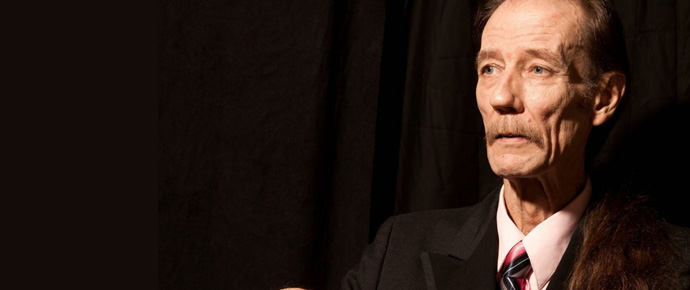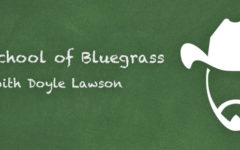
This reflection on the importance of Tony Rice in contemporary bluegrass is a contribution from Reed Jones, bass player and songwriter with Audie Blaylock and Redline. We thank him for these insights.
The evolving story of bluegrass music is punctuated by defining moments. Some of its independent clauses are extensions of the previous idea, and they foreshadow and link up with the next brilliantly-chosen turn of phrase. They overlap in ways that keep it in the family and sustain its deep traditions, which often means adaptation and change. Think of the departure of Flatt and Scruggs from Bill Monroe and the Blue Grass Boys to spin their own beautifully-crafted bluegrass tale, or how Jimmy Martin left Monroe’s outfit to later join forces with Bobby and Sonny Osborne, the latter of which also briefly featured in Monroe’s ongoing musical saga.
You also have the crossing and concurrent storyline of the Stanley Brothers, who obviously read their share of Monroe, but whose pen scratched down meaningful volumes informed by a slightly different, yet equally ancient tonality. And while there remain many others who contributed their own meaningful lines by putting musical pen to paper and baring their souls, few deserve the reverie typically reserved for the first generation like Tony Rice does. But this is no historical analysis, although the context is helpful in understanding the greatest guitarist bluegrass and acoustic music has ever known. This is about defining moments…and punctuation…and Tony Rice. He’s not only earned several chapters in the bluegrass history book, he accentuates and expands it, especially when placed within the longer arc of its story.
Tony Rice wielded “The Antique,” his 1935 Martin D-28 formerly owned by Clarence White, with the staying power of Shakespeare, the lyricism of Joyce, and the wit of Twain. In the same way the strokes of their pens told humanity’s story, bound it together in universal experience, and simultaneously helped form its future by expanding the boundaries of language, the strokes of Tony’s flatpick glued our music together and grew it with masterful expression. Informed by the past, he not only forged headlong into the musical future, he carefully and intentionally shaped it.
On a micro-level, he punctuated every song he played with the force of his unique rhythm and timing, while on a macro-level he was one of bluegrass’ few cataclysmic game-changers, putting a period on the end of the previous sentence and pushing the plot forward and deeper. As millions of needles followed the grooves of his records, he moved the needle with the same violent magnitude of Earl Scruggs, yet he did it with the calm beauty of his measured and graceful hands, efficiently navigating the strings and fretboard in the same way he did his ever-evolving musical landscape. And so in these moments of great loss, we are reminded of both the overarching and the personal, and how like Tony’s music, they cannot be so easily partitioned.
My associations with Tony were limited, but try telling that to my heart. His intro to Muleskinner Blues instantaneously changed my life at the age of 16, and caused me to drive an hour one-way to the nearest store that sold that recording. There was no Amazon Prime, no streaming, and there was no way I could wait to devour that album. I was on fire, and with that comes a compounding sense of urgency. When I put the CD in my car stereo and promptly set its volume to “destroy,” everything I knew about the guitar was exactly that: destroyed. The kickoff to that record’s opener, Cold On the Shoulder, was devastating.
I’m not sure I got past that song the entire hour’s drive home, and I bet the engine in that car is still whining in the key of Bb. In that moment, Tony did what he had been doing since he began publicly putting shell to string: changing the world. And do not be mistaken, that is not hyperbole, my world literally changed, much like the acoustic guitar world changed, and whether or not it understood, the entire music world changed, too.
When I was graduating from college with a degree in history, I was required to write a 25-page original research paper, so I chose to research The Bluegrass Album and how it helped re-orient bluegrass music in a more traditional direction, while its individual players were simultaneously expanding its boundaries. I had a lengthy phone conversation with Tony in the wee hours of the morning, because as he said, “I keep vampire hours.” That conversation confirmed what his music had been telling me for years, that he was a deep and thoughtful well of knowledge, passion, and genius. He was so arresting and articulate, establishing him in my mind as the bard of bluegrass and acoustic music.
The words he spoke came out in fully-developed paragraphs, punctuation and all. He rendered my prepared questions useless; he needn’t be led, only heard and heeded. Terrible as that paper was in hindsight, its existence did warrant a citation in his official biography, and seeing my name in the back of that book means more to me than I can express. When I missed his call returning my initial request for an interview, he left me a voicemail that I can never erase. “Hey Reed, this is Tony Rice…”
I saw Tony many times in concert in many different configurations. As a member of Audie Blaylock and Redline, I played on the same bill as him and shared some moments with him backstage. I remember him walking up to Audie, putting down the case that held “The Antique,” and hugging my boss’ neck. He asked Audie about his band, and was the consummate gentleman to me. I photographed his guitar and tried not to appear awkward and intimidated by our interaction, all while trying not to pee down my leg. At least that last part was a success.
To be sure, I am a nobody; but in that sense, I am everybody. Everyone who ever interacted with Tony became immediately aware of his singularity. His singing, his playing, his obsessive attention to detail, the way he dressed, how he carried himself, his song selection, his tone, his arrangement and interpretation, the very idea of him…it changed the acoustic guitar, it changed music, and it changed me.
If you’re reading this, there’s a good chance it changed you, too. And so while there are many that can share more personal remembrances and tributes, people that knew him well, that shared the studio or stage with him and called him friend, the mark of his greatness is found in the profundity of his impact on people that didn’t know him in that way; although his music would indicate otherwise. This is why the loss feels so great to so many. His gifts became like the furniture in our homes. It decorated the walls of our lives, it gave us comfort and rest, support and beauty…but we often neglect to take constant note of its presence. We become used to it, and now it’s gone.
Indeed, Tony punctuated our music, its history and our lives, but not all punctuation has the same purpose or impact. Commas are not as strong as semi-colons, yet even their potency has its limits. The colon has a certain resoluteness, but it’s often a signal to what comes next, and in doing so lacks a definitive resolution. As does the exclamation point, which invariably leaves you wanting more; while a question mark always begs an answer or further contemplation. A period, though, is so coldly final and settled, and that’s what has me so deeply unsettled with the passing of Tony Rice.
For the last several years, Tony has been out of the spotlight. He has been unable to perform, yet the fact that he was still with us was of some comfort. It was like an ellipsis…to be continued. There was comfort in that, there was hope. Tony’s passing on Christmas day placed a decidedly pointed period on a mesmerizingly-bright career. Yet that period sturdily secures and solidifies what we already knew, but didn’t always recognize while he was with us: that Tony Rice has taken his place alongside the storied body of work he created. He has transcended this earthly life in the same way that his mastery and music continues to help us transcend its sorrows; and so to that end, the period, while real and painful, does not have the final say.
Tony Rice will continue to be my, and countless others’, greatest musical influence, and will continue to change worlds…period.







